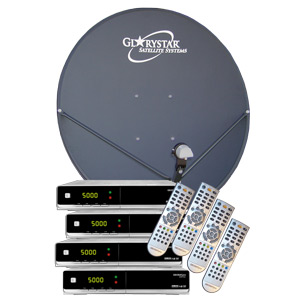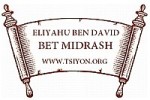|
Tsiyon News
 Tsiyon
Road is now on Glorystar Satellite! -
We are happy to
announce that Tsiyon Road is now being broadcast 24/7/365
from Galaxy 19, available through Glorystar Satellite. Glorystar
is a family-friendly Christian alternative to Direct TV
and Dish TV. A major difference is - there are no monthly
subscription payments! We will be sharing more about our new
Glorystar affiliation soon, including special deals on
Glorystar Satellite for our listeners, but for now we
would just like to say that we are delighted that Glorystar
will be making Tsiyon Road available to millions of people
living virtually anywhere in North America, with the Caribbean and
some of South America also in reach. Tsiyon
Road is now on Glorystar Satellite! -
We are happy to
announce that Tsiyon Road is now being broadcast 24/7/365
from Galaxy 19, available through Glorystar Satellite. Glorystar
is a family-friendly Christian alternative to Direct TV
and Dish TV. A major difference is - there are no monthly
subscription payments! We will be sharing more about our new
Glorystar affiliation soon, including special deals on
Glorystar Satellite for our listeners, but for now we
would just like to say that we are delighted that Glorystar
will be making Tsiyon Road available to millions of people
living virtually anywhere in North America, with the Caribbean and
some of South America also in reach.
If you already have
the needed satellite equipment tune us in right now!
Tsiyon Road
Galaxy 19
Frequency: 11836
MHz (V)
Symbol Rate: 20.770
Our New Homepage
Slider -
We've installed a new homepage with slideshow at our
Tsiyon.org website.
This is mostly for the benefit of new visitors, learning about us
for the first time from Glorystar. While this will help new
visitors, some of our regulars probably don't like the change (Who
likes change - right?). Never fear. It is only temporary. In the
meantime, you can click through to our site from a link at the
bottom of the page or, you can click through to the appropriate page
by clicking on the slides as the slide you are interested in
appears. It's really pretty simple, and if you click around a little
bit you might even find something you haven't seen at the site
before.
Our New Tsiyon
Tabernacle Chat - Members at the
Tsiyon Tabernacle may have
noticed our new chat feature. If not, you can locate it at the
bottom of the footer in the Tabernacle. Currently you can
chat with other members who are logged in when you are, using text
and/or audio-video chat. There are a number of different ways it can
be configured and other features that can be added to it. Let us
know your ideas.
Tsiyon Q + A
Listener Question - What
about tzitzit?
Q. I love your program, but I was surprised by a
recent comment in the Midrash that seemed to be against tzitzit.
Isn't wearing tzitzit a Torah commandment?
A. I think a
number of folks may not of fully grasped the point of that brief
comment about tzitzit, but I assure you, no disrespect was meant
toward the Torah. Here is the entirety of what the Torah says on
this topic.
Speak to the sons
of Israel, and tell them that they shall make for themselves
tassels on the corners of their garments throughout their
generations, and that they shall put on the tassel of each
corner a cord of blue. 39 It shall be a tassel for you to look
at and remember all the commandments of YHWH, so as to do them
and not follow after your own heart and your own eyes, after
which you played the harlot, 40 so that you may remember to do
all My commandments and be holy to your Elohim.
Bamidbar/Numbers
15:38-40
"You shall make yourself tassels on the four corners of your
garment with which you cover yourself."
Devarim/Deut 22:12
When we compare these
verses we find they do indeed command the use of tassels in a
particular way. These tassels, sometimes also called "fringes" are
translated from the Hebrew word tsiytsith (H6734), or
tzitzit. YHWH told the Israelites that these are specifically to
adorn "the four corners of your garment with which you cover
yourself." Notice that this is a specific garment that has four
corners, and does not apply to other types of garments. The
commandment does not command that this sort of garment must be worn,
or that tzitzit must be worn on all types of garments.
In the Rabbinic
tradition, this sort of four-cornered garment is called a tallit.
The Jewish Encyclopedia tells us more about this traditional
Jewish garment.
Mantle with
fringes (zizit) at the four corners; a prayer-shawl worn over
the garments, and used by men after marriage and, in modern
times, by boys after their confirmation as "bar mizwot." The
tallit, which can be spread out like a sheet, is woven of wool
or silk, in white, with black or blue stripes at the ends. The
silk ones vary in size, for men, from about 36 × 54 inches to 72
× 96 inches. The woolen tallit is proportionately larger
(sometimes reaching to the ankle) and is made of two lengths
sewed together, the stitching being covered with a narrow silk
ribbon. A ribbon, or, for the wealthy, a band artistically woven
with silver or gold threads (called "spania"), with the ends
hanging, and about 24 inches long by from 2 to 6 inches wide, is
sewed on the top of the tallit. From the four corners of the
tallit hang zizit, in compliance with the Mosaic law.
This same article also
makes this comment about the origin of the tallit.
The original
tallit probably resembled the "'abayah," or blanket, worn by the
Bedouins for protection from sun and rain.
What we glean from
this is that the original garment spoken about in the Torah was not
a garment especial made for religious use. Rather, the commandment
was directed towards a utilitarian garment generally in use by men
in ancient times, much like a blanket, "for protection from sun and
rain." The tzitzit on this common four-corner garment was thus
intended to be a frequent reminder of the commandments of YHWH in
the course of the Israelite's ordinary day. In other words, this is
about bringing YHWH into ones life throughout an ordinary day. This
is NOT a garment intended for some special religious use. However,
by the time of Y'shua Messiah this commandment was perverted by some
into a religious object through which one could put their
religiosity on display. Y'shua took note of this, saying regarding
the religious leaders of His day:
But all their
works they do to be seen by men. They make their tefillin broad,
enlarge the fringes (tzitzit) of their garments, and love the
place of honor at feasts, the best seats in the synagogues, the
salutations in the marketplaces, and to be called ‘Rabbi, Rabbi’
by men. Mat 23:5-7
The point is, tzitzit
were never meant for the purpose of putting on a religious show, and
that perversion of Torah was rightly condemned by Messiah.
So, what about us?
Must we wear tzitzit? Nobody I know wears the original blanket-like
garment of Bible times throughout the day, which this commandment is
aimed at. Neither are we required to wear such a garment. I suppose
you can assume you should wear tzitzit on your business suit or your
blue jeans, or whatever, but if you do, that is your choice - not
what the Torah actually commands. Remember too, this commandment is
not about putting on a religious show, which affixing and wearing
tzitzit where not commanded may very well be. Of course, each person
must follow his conscience, so it is not for me to judge anyone that
may feel compelled to wear tzitzit on their modern clothing.
Personally, I don't
see the commandment as requiring that, while I do see wearing a
purely traditional religious garment as out of step with the real
purpose of the commandment, in keeping with Messiah's words above.
So as for me, I have no occasion in my life as it now stands wherein
wearing tzitzit is required. I also don't need to invent a
substitute for such a command as a memory device, because Torah is
now written in our hearts. YHWH Himself is literally with me all the
time, and His Spirit is faithful to remind me of His commandments as
often as I have the need. In truth, the "cord of blue" of the
tzitzit was prophetic of that very Holy Spirit which is now always
resident within Messiah's talmidim (the "sod" level of this
commandment, if you will) fulfilling this very commandment. Finally,
I don't have a need to wear traditional Jewish garments to feel or
appear more "Jewish" because I am Jewish on the inside, and nothing
I wear or don't wear on the outside is ever going to change that.
Shalom!
Need to talk to us? - In the USA and Canada just call us toll
free at (888) 230-2440 for help. Internationally, email us and we
will arrange a phone or Skype call for you.
From Eliyahu
It is not surprising that we find many firsts in Genesis. That
continues in our latest midrash. Here we consider the death of Sarah
and details of how Abraham dealt with it. Since death touches us
all, this brings up the larger question of what death means in the
lives of each of us. While that may sound like a dark topic, quite
the opposite is true. There is a bright future for every person who
dies in Messiah. You will thrill to this uplifting truth as we
consider what the Scriptures tell us about death - and victory
beyond the grave!
Shalom!
Eliyahu ben David
www.tsiyon.org
|
 "Sarah died in Kiriath Arba, in the land of Canaan. Abraham came to mourn for Sarah, and to weep for her." Gen 23:2
"Sarah died in Kiriath Arba, in the land of Canaan. Abraham came to mourn for Sarah, and to weep for her." Gen 23:2







 Tsiyon
Road is now on Glorystar Satellite! -
We are happy to
announce that Tsiyon Road is now being broadcast 24/7/365
from Galaxy 19, available through Glorystar Satellite. Glorystar
is a family-friendly Christian alternative to Direct TV
and Dish TV. A major difference is - there are no monthly
subscription payments! We will be sharing more about our new
Glorystar affiliation soon, including special deals on
Glorystar Satellite for our listeners, but for now we
would just like to say that we are delighted that Glorystar
will be making Tsiyon Road available to millions of people
living virtually anywhere in North America, with the Caribbean and
some of South America also in reach.
Tsiyon
Road is now on Glorystar Satellite! -
We are happy to
announce that Tsiyon Road is now being broadcast 24/7/365
from Galaxy 19, available through Glorystar Satellite. Glorystar
is a family-friendly Christian alternative to Direct TV
and Dish TV. A major difference is - there are no monthly
subscription payments! We will be sharing more about our new
Glorystar affiliation soon, including special deals on
Glorystar Satellite for our listeners, but for now we
would just like to say that we are delighted that Glorystar
will be making Tsiyon Road available to millions of people
living virtually anywhere in North America, with the Caribbean and
some of South America also in reach.